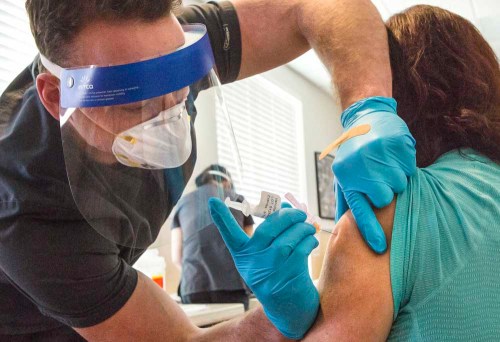‘Super immunity’ against COVID-19 more widely possible, new OHSU research finds
Published 8:45 am Thursday, January 27, 2022

- Sam Hester, a family practice medical assistant supervisor with Mosaic Medical, administers the second dose of COVID-19 vaccine into the arm of Julie Stamper, the kitchen coordinator at Family Kitchen, during a vaccination clinic Feb. 19 at Bethlehem Inn in Bend.
Getting a COVID-19 infection before or after the COVID-19 vaccine can create “super immunity,” researchers in Oregon found, complementing previous research that could point to an eventual path to co-existence with the virus.
“These results, together with our previous work, point to a time when SARS-CoV-2 may become a mostly mild endemic infection like a seasonal respiratory tract infection, instead of a worldwide pandemic,” one of the Oregon Health & Science University study’s co-authors, Marcel Curlin, said in a statement.
More immediately, the research indicates people who have had COVID-19 should get vaccinated, senior co-author Fikadu Tafesse said.
“The combination is the best,” Tafesse said in an interview.
The OHSU research team previously found that the blood of those who had an infection after being vaccinated — called a breakthrough infection — produced a dramatic antibody response when exposed to the virus, as compared to blood from people who were vaccinated but didn’t get sick.
Now, the research shows that getting a shot after recovering from COVID-19 provides similarly strong protections, dubbed “super immunity.” In both cases, antibodies in the blood were found to be 10 times or more as potent as the antibodies in people who have been vaccinated but never had the disease, the researchers found.
People with this “super immunity” should be better protected from both infection and severe illness, the researchers said.
Tafesse was cautious about how the public should interpret the results, warning that it is not worth intentionally getting a COVID-19 infection, especially with the risk of long-term consequences.
“Trust me,” Tafesse said. “I get that question almost every day.”
But the question could be moot because the omicron variant is so incredibly transmissible that health officials have said they believe most Oregonians will come in contact with it.
The “end game” could be that a combination of vaccinations, booster shots and infection-derived immunity make infections from the virus less and less severe, Tafesse said.






